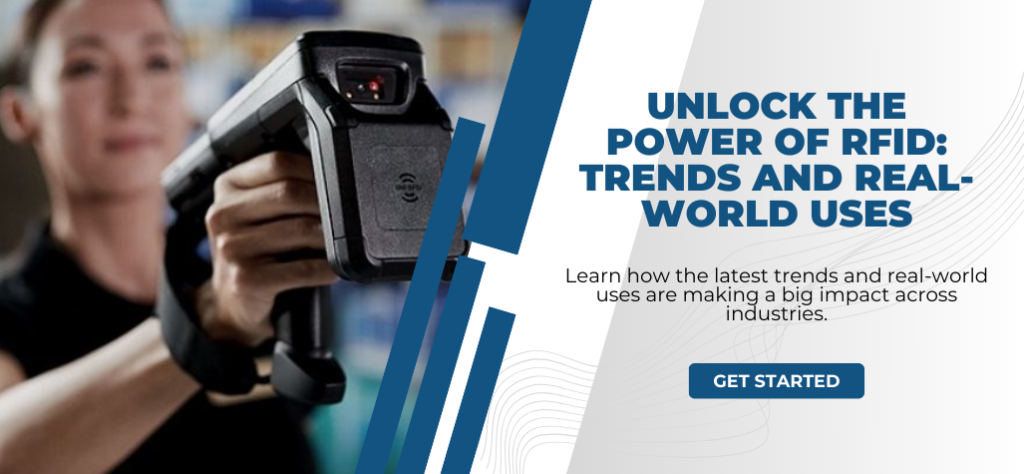Table of Contents
Toggle
What Is RFID Technology?
RFID (Radio Frequency Identification) technology is a wireless communication method that uses electromagnetic fields to identify and track objects, animals, or people. At its core, RFID Definitions consists of three key components:
- RFID Tags all devices that store information about the item to which they are attached. Tags can be passive (with no internal power source) or active (with a built-in battery).
- RFID Readers: Devices that emit radio waves to read the data stored on RFID tags.
- Antenna: Facilitates communication between the RFID Definitions and the reader.
RFID technology is widely used in retail, logistics, healthcare, and manufacturing industries due to its ability to enhance operational efficiency and provide real-time data.
How RFID Technology Works
The process of RFID communication involves:
- Tag Activation: The RFID reader emits radio waves that activate the tag.
- Data Transmission: Once activated, the tag transmits stored data to the reader.
- Data Processing: The reader sends this information to a computer system for analysis.
This seamless process enables fast and accurate identification, making RFID Definitions ideal for tracking and inventory management.
Key Trends in RFID Technology in 2024
1. Increased Adoption in Retail
Retailers are using RFID technology to improve inventory accuracy and streamline supply chain processes. RFID tags help track products from warehouses to store shelves, ensuring timely restocking and reducing losses.
2. Integration with IoT (Internet of Things)
RFID technology is increasingly being integrated with IoT devices to enable smart tracking and real-time updates. For example, IoT-enabled RFID Definitions can provide live updates on the location and condition of goods during transit.
3. Enhanced Security Features
Advancements in RFID Definitions have introduced encrypted tags and secure authentication protocols, making it a reliable solution for safeguarding sensitive information.
4. Application in Healthcare
Hospitals are leveraging RFID Definitions to track medical equipment, manage patient records, and monitor pharmaceuticals. This ensures better patient care and reduces errors.
5. Sustainability Focus
As businesses prioritize sustainability RFID Definitions are being designed with eco-friendly materials. This trend aligns with global efforts to reduce electronic waste.
Practical Uses of RFID Technology
RFID technology has proven to be a game-changer in the healthcare industry, offering numerous benefits that improve operational efficiency and patient care. Here are some practical uses:
Tracking Medical Devices:
RFID tags attached to medical devices like infusion pumps, wheelchairs, and surgical instruments ensure that equipment is:Easily located when needed.
Properly maintained through timely service reminders.
Securely stored to prevent unauthorized use or theft.
Patient Monitoring:
RFID-enabled wristbands or badges are used to:Track patient movements within a hospital, ensuring they are in the right department or treatment area.
Enhance patient safety by reducing incidents such as infant mismatches or unauthorized discharges.
Provide medical staff instant access to patient records and history through a simple scan.
Pharmaceutical Inventory Management:
Managing pharmaceutical stocks efficiently is critical for patient care and compliance. RFID Definitions helps by:Monitoring drug inventory levels in real-time to avoid shortages or overstocking.
Ensuring that medications are stored correctly and are not expired.
Automating the distribution and tracking of high-value or controlled substances to comply with regulations.
Reducing Errors in Medical Procedures:
RFID tags embedded in surgical sponges or instruments help ensure no items are left inside a patient during surgery.Emergency Response:
RFID Definitions assist in emergencies by:Quickly identifying patients and their medical history.
Allocating resources effectively during disasters or mass casualty incidents.
By integrating RFID Definitions, healthcare facilities can significantly improve operational workflows, patient outcomes, and regulatory compliance.
Benefits of RFID Technology
1. Accuracy
RFID Definitions provide high levels of accuracy, making it an ideal solution for tracking and managing inventory. Businesses can achieve nearly 99% accuracy in stock management.
2. Efficiency
With RFID systems, processes like scanning and data entry are automated, significantly reducing time and labour requirements.
3. Cost-Effectiveness
While the initial investment in RFID Definitions might be high, its long-term benefits, such as reduced losses and increased efficiency, lead to substantial cost savings.
4. Scalability
RFID systems are scalable and can be implemented in small setups as well as large enterprises, making them versatile across industries.
5. Enhanced Security
With encrypted tags and secure authentication, RFID technology ensures the safe handling of sensitive data.
Challenges in RFID Technology Implementation
1. High Initial Costs
The cost of RFID tags, readers, and infrastructure can be a barrier for small businesses.
2. Interference Issues
RFID systems may face interference from metals or liquids, affecting performance.
3. Data Overload
With continuous tracking, RFID Definitions generate large volumes of data, requiring robust systems to process and store information.
4. Privacy Concerns
As RFID technology involves tracking, it raises concerns about data privacy and unauthorized access.
The Future of RFID Technology
As RFID technology continues to evolve, its applications are expected to expand across various domains:
Smart Cities: RFID will play a crucial role in managing urban infrastructure, such as public transportation and waste management.
Agriculture: Farmers will use RFID tags to monitor livestock and crop health.
E-Commerce: RFID technology will further streamline warehousing and last-mile delivery processes.
With ongoing advancements, RFID Definitions is poised to revolutionize how businesses operate and interact with their environments.
Conclusion
RFID technology is a game-changer in the world of tracking and identification. From retail to healthcare, its applications are vast and impactful. By staying updated on the latest trends and overcoming implementation challenges, businesses can unlock the full potential of RFID technology in 2024 and beyond. Whether improving inventory accuracy or enhancing customer experiences, RFID technology offers a smart, efficient, and secure solution for the modern era.